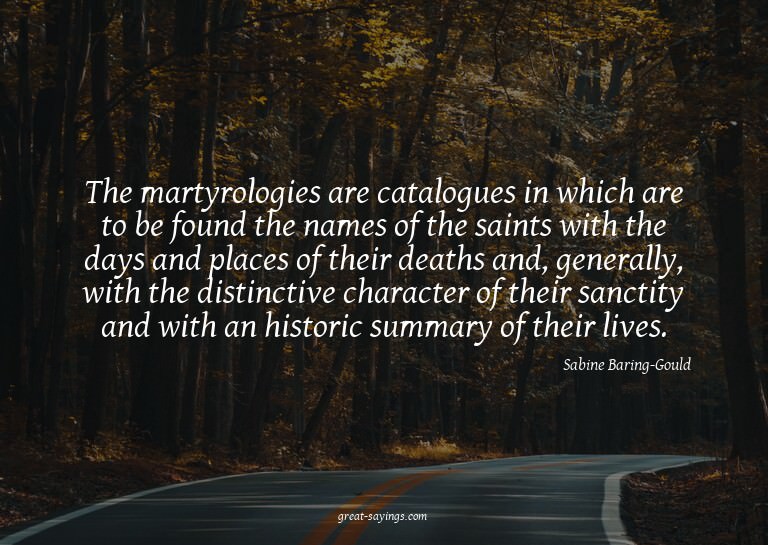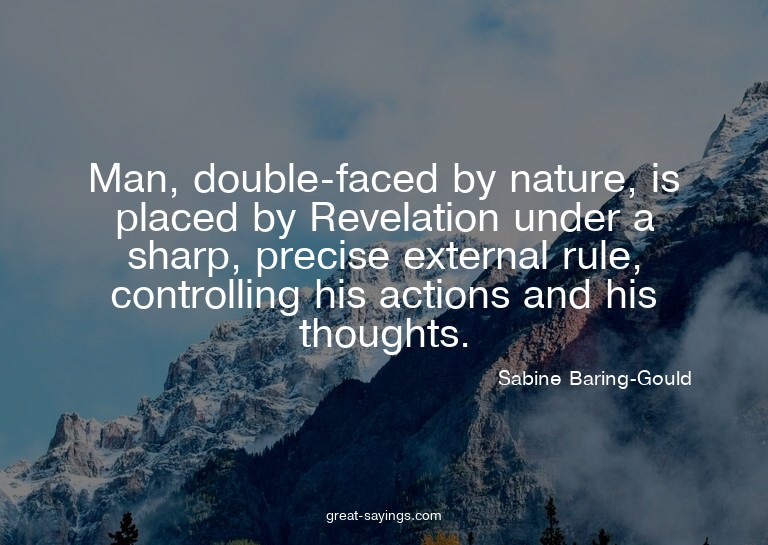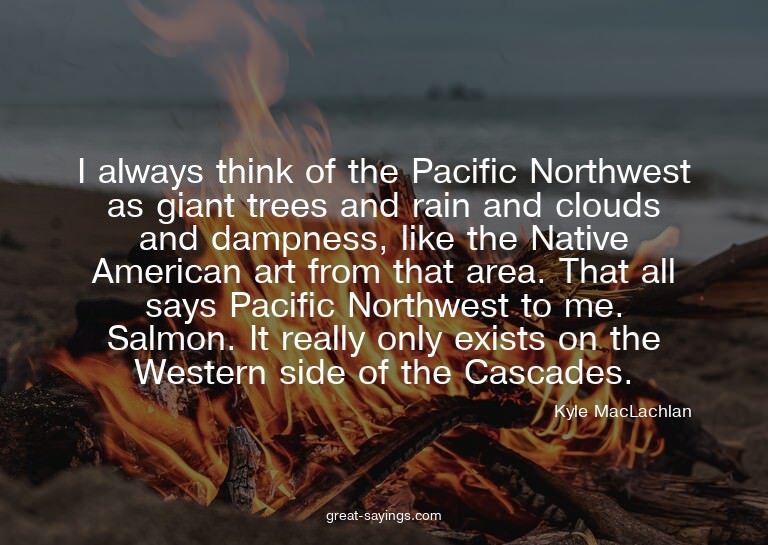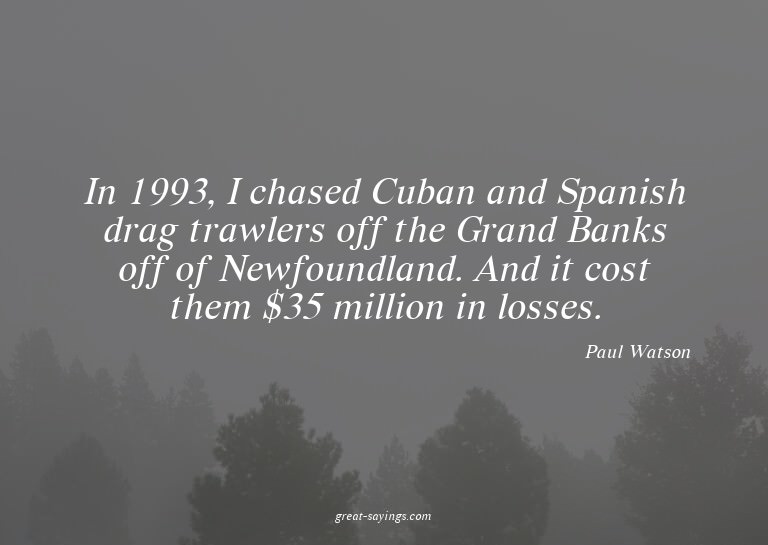Words matter. These are the best Sabine Baring-Gould Quotes, and they’re great for sharing with your friends.

The martyrologies are catalogues in which are to be found the names of the saints with the days and places of their deaths and, generally, with the distinctive character of their sanctity and with an historic summary of their lives.
About two hundred or two hundred and fifty years after the death of Grettir, his history was committed to writing, and then it became fixed – nothing further was added to it, and we have his story after having travelled down over two hundred years as a tradition.
Among the old Norse, it was the custom for certain warriors to dress in the skins of the beasts they had slain, and thus to give themselves an air of ferocity, calculated to strike terror into the hearts of their foes.
The Breton peasant is said to have a hard head. He is obstinate and resists outside pressure to alter his creed or his customs.
In Cornwall, it is quite possible to take a stride from the richest vegetation into the abomination of desolation. It has been said in mockery that Cornwall does not grow wood enough to make coffins for the people.
The universal practice of closing the eyes of the dead may be thought to have originated in the desire that he might be prevented from seeing his way.
It is somewhat remarkable that Cornwall has produced no musical genius of any note, and yet the Cornishman is akin to the Welshman and the Irishman.
In winter, the Icelanders told the tales of the brave men of old in their families, and so the tradition was handed on from father to son, the same stories told every winter, till all the particulars became well known.
The great majority of the nobility and gentry of England clung to the doctrine and ceremonies of the ancient church, and yet were united in determination to oppose the papal claims.
Many traditions date the existence of angels and demons from a remote period before the creation of the world, but some connect the fall of Satan and his host with the creation of man.
At the English Revolution, when William of Orange came to the throne, the introduction of French wines into the country was prohibited, and this gave a great impetus to the manufacture of cyder and care in the production of cyder of the best description.
Ireland was, of old, called the Isle of Saints because of the great number of holy ones of both sexes who flourished there in former ages or who, coming thence, propagated the faith amongst other nations.
History, whether sacred or profane, hides her teaching from those who study her through coloured glasses. She only reveals truth to those who look through the cold clear medium of passionless inquiry, who seek the Truth without determining first the masquerade in which alone they will receive it.
In France, successive waves of Gaul, Visigoth, and Frank have swept over the land and have dominated it. But the fair hair and blue eyes and the clear skin of the conquering races have been submerged by the rising and overflow of the dusky blood of the original population.
A residence of many years in Yorkshire, and an inveterate habit of collecting all kinds of odd and out-of-the-way information concerning men and matters, furnished me, when I left Yorkshire in 1872, with a large amount of material, collected in that county, relating to its eccentric children.
Black was not the universal hue of mourning in Europe. In Castile, white obtained on the death of its princes.
Saint Mochua was the son of a certain Cronan, of noble race, and spent his youth in fighting. At the age of thirty, he laid aside his arms and burnt a house, with all its contents, which had been given to him by his uncle, saying that a servant of Christ should take nothing from sinners.
The tribal system from which the Celt never freed himself entirely was the curse of the Celtic race, predooming it to ruin.
English churchmen have long gazed with love on the primitive church as the ideal of Christian perfection, the Eden wherein the first fathers of their faith walked blameless before God and passionless towards each other.
The fold is that place where He keeps His flock shut behind the hurdles of the Ten Commandments. Every now and then, a sheep leaps one of these hurdles or pushes his way between them and runs away into forbidden pastures. Then the Good Shepherd goes after the erring sheep and brings it back.
When the British became Christian, Christianity in no way altered their political organisation.
In ancient British times, the whole country belonged to tribes, and the tribes owned their several districts. At the head of each tribe was the chief.
The Devonian and Cornishman will be found by the visitor to be courteous and hospitable. There is no roughness of manner where unspoiled by periodic influx of strangers; he is kindly, tender-hearted, and somewhat suspicious.
The Welsh have everywhere adopted the Cymric tongue; they hug themselves in the belief that they are pure descendants of the ancient Britons, but in fact, they are rather Silurians than Celts.
In Ireland, the tribes are called after the founder, as the Hy Conaill, Hy Fiachra, or sons of Conal, sons of Fiech, through grand, great-grand, and great-great-grandchildren.
One of the great advantages of the study of old Norse or Icelandic literature is the insight given by it into the origin of world-wide superstitions. Norse tradition is transparent as glacier ice, and its origin is as unmistakable.
No man need go blindly to destruction, for God has given him guidance and power of seeing whither he goes.
The charm of Brittany is to be found in the people and in the churches. The former, with their peculiar costumes and their customs, are full of interest, and the latter are of remarkable beauty and quaintness.
On many accounts, Cornwall may be regarded as one of the most interesting counties of England, whether we regard it for its coast scenery, its products, or its antiquities.
A family may be ruined by extravagance, but it is not always through ruin that the representatives in a family are to be found in humble or comparatively humble circumstances, but that the junior members of a gentle family went into trade.
We are accustomed in England to chalk in rolling downs, except where bitten into by the sea, but elsewhere it is riven and presents cliffs, and these cliffs are not at all like that of Shakespeare at Dover but overhang, where hard beds alternate with others that are friable.

Man, double-faced by nature, is placed by Revelation under a sharp, precise external rule, controlling his actions and his thoughts.
Cornwall bears a certain resemblance to Italy: each is like a leg or boot, but Italy stands a-tiptoe to the south, whereas Cornwall is thrust out to the west. But, whereas Italy is kicking Sicily as a football, Cornwall has but the shattered group of the Scilly Isles at its toe.
I look back with the greatest pleasure to the kindness and hospitality I met with in Yorkshire, where I spent some of the happiest years of my life.
The north coast of Brittany is eaten into bays from which the sea retreats to considerable distances, and is fringed with reefs and islands. It is a favourite resort of Parisians throughout its stretch, from Dinard to Plestin.
According to Celtic law, all sons equally divided the inheritance and principalities of their father.
In art, S. Bridget is usually represented with her perpetual flame as a symbol, sometimes with a column of fire, said to have been seen above her head when she took the veil.
I went to Iceland in 1861 and went over nearly every bit of the ground made famous by the adventures of Grettir.
Mediaeval mythology, rich and gorgeous, is a compound like Corinthian brass, into which many pure ores have been fused, or it is a full turbid river drawn from numerous feeders, which had their sources in remote climes.
The Dumnonii, whose city or fortress was at Exeter, were an important people. They occupied the whole of the peninsula from the River Parret to Land’s End. East of the Tamar was Dyfnaint, the Deep Vales; west of it Corneu, the horn of Britain.












